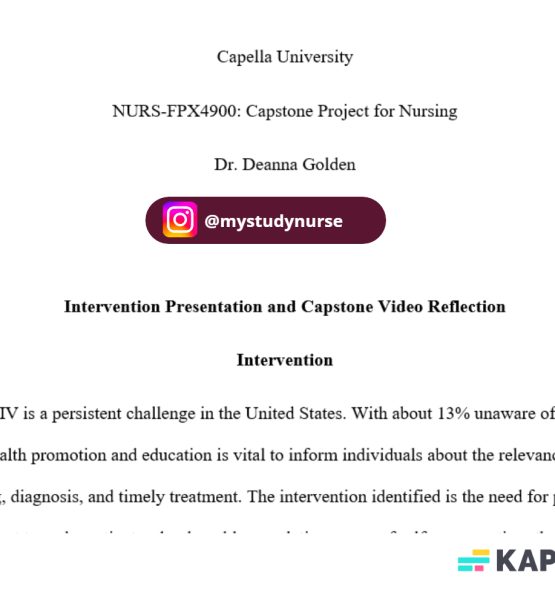


Intervention Presentation and Capstone Video Reflection
Capella University
NURS-FPX4900: Capstone Project for Nursing
Dr.
January 2024
Intervention Presentation and Capstone Video Reflection
Intervention
Availability:In Stock
HIV is a persistent challenge in the United States. With about 13% unaware of their status, health promotion and education is vital to inform individuals about the relevance of screening, diagnosis, and timely treatment. The intervention identified is the need for proactive engagement to make patients ad vulnerable population aware of self-care practices that help monitor or control symptoms.
I focused on quality, cost, and safety of care since the three determine individuals’ ability to live healthy and fulfilling lives. Addressing the three reinforce individual and collective commitment to reducing health disparities common in underserved and under-resourced communities. Vulnerable population, largely the young groups between 13 and 29 years can access essential diagnosis, prevention, and treatment services to avoid delayed or postponed care across the continuum (Nyati et al., 2020).
Focusing on increased HIV promotion and education helps patients, families, and healthcare providers identify evidence-based and patient-centered practices and resources relevant for treating HIV. HIV self-management practices enable patients to access tailored interventions for monitoring and controlling symptoms throughout the care process. Patients learn to improve quality, safety, and cost of care by adhering to lifestyle modifications, medications, and other strategies designed to prevent escalating symptoms.
My first experience was a conversation with a patient living with HIV. The interaction provided insights into the need for improvements that make quality, safe, and affordable care accessible to patients living with HIV. The patient from a low-resource setting agreed that it is challenging coping with quality, safety, and cost concerns evident in under-resourced and underserved communities. Challenges such as inadequate staffing, inconveniences in accessing ARVs, and low income that denies individuals from accessing healthy foods and other self-care measures prevent patients from living longer and healthier lives (Nyati et al., 2020).
The patient expressed optimism in accessing better services by enrolling for Medicaid and Medicare programs. The patients also expressed desire to access primary care providers and specialists conveniently for education and counseling on tailored interventions for improving quality of life. Limited access to financial aid programs is a serious challenge that limits access to prescription drugs and other services appropriate for preventing escalating symptoms. Challenges accessing private insurance also undermine access to comprehensive care. However, the patient
Reviews
There are no reviews yet.